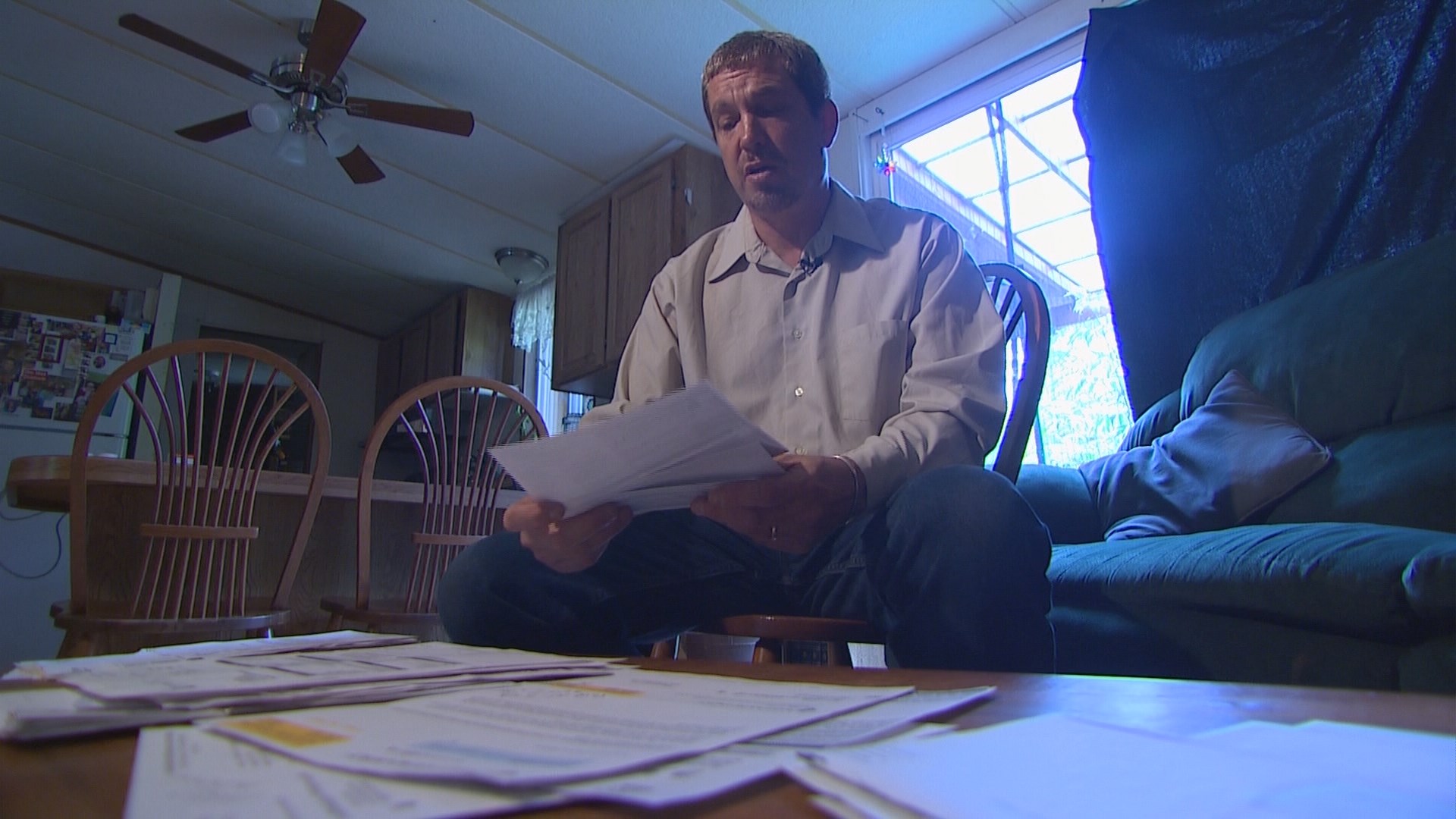After a successful 15-year career at the Puget Sound Naval Shipyard (PSNS), even being named employee of the year in 2015, Kevin Albert of Bremerton said he’s been “discarded.”
“Absolutely, I’m a number,” said Albert.
But Albert’s only crime was becoming sick from exposure to life threatening chemicals and heavy metals inside the site’s wastewater treatment facility.
And because he got sick on the job, by federal law, he is supposed to be put in another position away from toxins or be paid his salary. Neither of those things has happened.
Due to dozens of doctors’ visits, multiple trips to the ER, and mandatory leaves due to acute breathing problems, Albert hasn’t had a steady paycheck in four years. He has had absolutely no income since PSNS doctors sent him home in 2016 due to “occupational” health problems that made it too dangerous for him to be in the industrial setting.
“It has been miserable (to go without pay),” said Albert.
Once active and easily able to support his family, Albert is now struggling physically and financially. He’s been diagnosed with reactive airways disease, irritable larynx syndrome, vocal cord dysfunction, anxiety, depression, and PTSD.
His family has gone without electricity when the bills couldn’t be paid. They’ve had to turn to a food bank to get enough to eat. The home he shares with his wife and special needs daughter has been in foreclosure on several occasions. He’s taken day-labor jobs, borrowed from family and friends and sold family possessions to cover the very basics.
“I don’t think (the Navy) cares,” said Albert. “What they did…the people that are affected need to compensated and need to be accommodated. They haven’t done anything.”
The plant was hailed as “state-of-the-art” by the Navy when it opened in 2006. But a six-month investigation by the KING 5 Investigators has found that even as the doors first opened, complaints were piling up that the plant was unsafe: safety systems such as cyanide alarms didn’t work, pipes routinely leaked hazardous liquids such as cyanide water, and the ventilation system meant to draw toxic vapors out of breathing spaces was faulty as well.
Testing in 2013 finally led to the Navy temporarily shutting down the plant. Several internal investigations found that employees had been exposed above legal limits to chlorine gas and that systems meant to keep the workforce safe were “inoperable” or “inadequate.”
Despite these opinions by the Navy’s own experts, representatives of the shipyard’s public affairs office told KING 5 the treatment plant “is and always has been safe.” And that no employees have been exposed to vapors above legal limits.
In 2013 investigators from the U.S. Occupational Safety and Health Administration (OSHA) issued two “serious” violations to the Navy, including the failure to “identify and evaluate the respiratory hazards in the workplace.”
“In Building 1109, during cyanide destruction process, chlorine gas was emitted in levels above the (federally set legal limits), and the employer had not evaluated this respiratory hazard and (did not issue) appropriate respiratory protection,” wrote OSHA’s area director in 2013.
As Albert battled his health, he found himself waging another, unexpected fight – getting the help and compensation he needs and by federal law is entitled to.
Civilian employees at the shipyard are to turn to the U.S. Department of Labor’s Office of Workers’ Compensation Program (OWCP) after they experience a work-related illness or injury.
After a six-year wait, OWCP accepted Albert’s claims for irritable larynx syndrome and vocal cord dysfunction, but for his most serious condition – reactive airways disease – OWCP continues to issue denial letters.
“Your claim for compensation is denied as the medical evidence does not demonstrate that the claimed medical condition is related to (a) work-related event,” wrote claims examiner Hany Tran of OWCP in 2015.
“If I was the person making those decisions I wouldn’t be able to sleep,” said Albert.
This opinion is in direct contrast to the opinions of seven different occupational medicine specialists and pulmonologists who have determined his lung disease was directly caused or most likely caused by the Navy’s failure to keep him safe from toxic gasses.
“He has irritant-induced asthma (reactive airways dysfunction syndrome – RADS) as a result of his workplace exposures and confirmed by a methacholine challenge test on 7/20/16,” wrote Dr. Sverre Vedal of Harborview Medical Center.
“Mr. Albert is considered disabled with respect to exposure to industrial environments and he should not work in the Bremerton Shipyards (sic) where there is unavoidable exposure to multiple dusts and fumes associated with a century of ship building and repair,” wrote Dr. Timothy Gilmore of Group Health in Bellevue.
“His present diagnosis of occupational asthmas is a direct result of these occupational exposures. He also has considerable anxiety at this time due to uncertainty regarding his health and work requiring ongoing exposure to these respiratory irritants and toxins,” wrote Dr. Michael McManus of Group Health in 2013.
Instead of these opinions, OWCP relied on the input of one of their independent medical examiners in Oregon. In 2016 Albert took unpaid time off from work to make the trip to attend what he said was a 15 to 20-minute visit with Dr. Alan Barker. Barker found Albert may have “hay fever” but other than that was a picture of health.
“They could not find a pulmonologist in the state of Washington so I was sent to Oregon. He decided that I was completely healthy,” said Albert.
Barker wrote in his analysis that the PSNS plant featured a “closed loop” system that kept workers safe. A closed loop systems means holding tanks were closed off with lids to prevent toxic gasses from venting into the breathing space of operators.
But the KING 5 Investigators have found that’s not true. While the original design called for lids on the tanks, they were never installed. Navy investigators in 2013 wrote “the Architecture and Engineering (AE) drawings specifies tank covers. It is unknown why no tank covers were installed.” There was no closed loop system. Since then the Navy has spent $2 million in upgrades to the plant, including the installation of lids and appropriate ventilation systems.
“I find it patently unjust that Mr. Albert is being penalized for the medical condition caused by his service at the Naval Shipyard, and that because no reasonable accommodations are being provided by his employer, he continues to be penalized by OWCP,” wrote Dr. Abid Haq of Kaiser Permanente’s Occupational Health Dept. on May 17, 2017.
A spokesperson for OWCP told KING they couldn’t comment on an individual case, citing privacy laws.
Albert said he’s not only been let down by OWCP but by his employer as well. It’s the Navy’s duty to accommodate an employee with a work-related illness with a suitable job. In his case, as per instruction from multiple physicians, that means a position away from fumes, toxins, and chemicals that would exacerbate his condition. It’s been 14 months since a PSNS medical officer sent Albert home due to occupational induced breathing difficulties. During that time the Navy has not placed him in a new position. He has no job and no paycheck.
“I think it’s absolutely criminal,” said Albert.
Albert has hired attorney Kevin Peck of Seattle to file a formal discrimination complaint against the Department of Defense for not making a workplace accommodation through the U.S. Equal Employment Opportunity Commission (EEO). If they do not prevail through the EEO process, Peck said they will most likely pursue litigation in federal court.
“He goes from employee of the year to being someone that they’re not even offering any type of accommodated position. It’s totally outrageous,” said Peck. “I think it’s somewhat ruthless. (The KING 5 reports) have been (informative) showing the effect that the gasses have had on Mr. Albert and his unfortunate co-workers. But there’s plenty of civilian jobs that he could be accommodated in. He’s given years of his life to work for the shipyard and when he suffers as a result of the gasses they exposed him to, they have to accommodate him and they refuse to do so.”
“Due to privacy restrictions, we are unable to comment on the details of any particular employee’s case. However generally speaking, (PSNS) is required by the Rehabilitation Act and the Americans with Disabilities Act Amendments Act to determine if an employee’s medical condition, whether work-related or not, can be accommodated,” wrote J.C. Mathews, PSNS Deputy Public Affairs Officer. “If the employee is disabled due to a work-related injury or condition, he or she may be able to receive payments from the Department of Labor’s Office of Workers Compensation Program. Other benefits through OWCP, such as vocational rehabilitation, may also be available. However, OWCP – not the shipyard – makes the determination whether the employee is eligible for payments or other benefits.”
Years of worsening health problems, financial worry and uncertainty about his future led Albert to develop anxiety, depression and thoughts of suicide. But currently he’s determined to fight the systems he said are working against him.
“I am so pissed that they can just ignore us and that’s what they thought," he said. "And they figured we can outlive them, we can outlast them. Done. I am done playing that game.”


